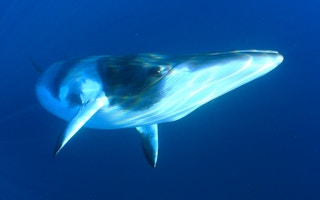Thanks to climate change, things are going wrong for the right whale. As the Atlantic warms, one ocean giant has had to shift its feeding grounds − and into more dangerous unprotected waters. Other marine mammals will find it harder to survive.
Eubalaena glacialis, or the critically endangered North Atlantic right whale, may in the last decade have lost more than a quarter of its population. There could be only 356 individuals left.
And a second, separate study reports that, thanks to climate change, the future also looks lean for ringed seals and other Arctic marine predators: as greenhouse gas emissions continue to increase, and seas get warmer, the fish these mammals depend on will get smaller, and more scarce.
US scientists report in the journal Oceanography that, because of a shift in ocean temperatures in the Gulf of Maine − their traditional and protected habitat − the abundance of copepods or tiny crustaceans that nourish the giant mammals has fallen. This in turn has reduced the rates of calving, and forced the whales from their favourite mid-summer feeding grounds to the cooler waters of the Gulf of St Lawrence.
These new feeding grounds have no protection in place to prevent ship strikes, or entanglement in fishing gear. In 2017, biologists confirmed 17 right whale deaths in Canadian waters. Ten were found dead in 2019. In the last two years, there have been four identified deaths. The creature has a normal lifespan of about 70 years.
The Gulf of Maine has been warming at depth, as ocean currents change in response to the climate emergency. The Atlantic Meridional Overturning Circulation, a part of the world climate powerhouse, could be changing, and with it the famous Gulf Stream that brings tropical waters into the North Atlantic.
That too has changed its trajectory in the last 10 years, and is now injecting warmer and saltier water into the Gulf of Maine, to alter the conditions that for most of human history provided food for the whales.
“Right whales continue to die each year,” said Erin Meyer-Gutbrod of the University of South Carolina, who led the study. “Protective policies must be strengthened immediately before this species declines past the point of no return.”
As the seas warm, the Artic ice retreats. The Arctic cod may be on the move, which is bad news not just for fishermen but for the seals and other creatures that depend on a rich energy source to maintain population numbers.
Smaller fish predominating
Canadian scientists report in the journal Ecology Letters that changes in the makeup, size and distribution of fish in Hudson Bay will begin to accelerate after 2025 and become rapidly more extreme unless humans drastically limit fossil fuel combustion.
And that would be bad news for the ringed seal, Phoca hispida: it would be left with a meaner food source. “We found that, by the end of the century, the large fatty Arctic cod may decline dramatically in terms of biomass and distribution.
“Then smaller fish like capelin and sand lance may become much more prevalent”, said Katie Florko, of the University of British Columbia, lead author. Warmer temperatures tend to favour smaller individuals. Arctic cod could shrink by up to 35 per cent; they will also tend to move further north.
“It costs energy to forage. Does that mean the seals will need to spend more energy to get a larger number of these smaller fish for the same amount of energy as capturing a bigger fish?”
Her co-author Travis Tai, of the Pacific Climate Impacts Consortium, said: “We’ve never seen such drastic change so quickly. We’re rolling the dice, and we don’t know exactly what will happen. When we have dramatic shifts in food web structure, we can expect large changes not only to how species such as ringed seals use the oceans, but also how people use the oceans.”
This story was published with permission from Climate News Network.










